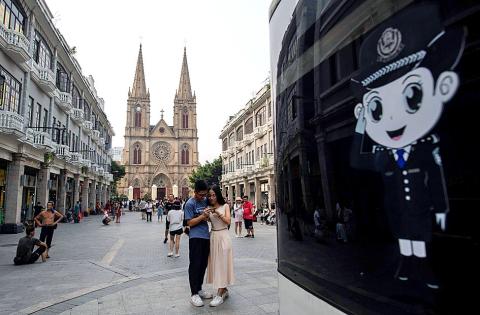The Vatican yesterday announced that it has reached a historic accord with Beijing on the appointment of bishops in China, which has so far named its own officials to a sole Beijing-recognized Catholic church.
Beijing immediately said it hoped for better relations, while Taiwan said its ties with the Vatican were safe despite the deal.
The accord “has been agreed following a long process of careful negotiation and foresees the possibility of periodic reviews of its application,” the Vatican said in a statement issued as Pope Francis visits the Baltic states.

Photo: AFP
“It concerns the nomination of bishops, a question of great importance for the life of the church, and creates the conditions for greater collaboration at the bilateral level,” it added.
Vatican spokesman Greg Burke downplayed any suggestion that the accord could have wider political implications.
The agreement “is not political, but pastoral, allowing the faithful to have bishops who are in communion with Rome, but at the same time recognized by Chinese authorities,” Burke said in Vilnius.
The Chinese Ministry of Foreign Affairs said that Beijing and the Vatican would push to improve bilateral ties after signing the agreement.
The deal was signed in Beijing by Chinese Vice Minister of Foreign Affairs Wang Chao (王超) and a Vatican delegation headed by Under-Secretary for Relations with States Antoine Camilleri, the ministry said in a brief statement.
The two sides “will continue to maintain communication and push forward the improvement of bilateral relations,” it said.
The Ministry of Foreign Affairs yesterday said that diplomacy is not a “zero-sum” game and cementing a long-lasting diplomatic relationship with the Vatican is Taiwan’s top priority.
“Taiwan-Vatican ties are stable because the two sides share the same values in democracy, human rights and religious freedom,” ministry spokesman Andrew Lee (李憲章) said.
“We believe that the Vatican must have held talks with China based on concern and respect for human rights and freedom of religion,” Lee said. “The most important thing for Taiwan is to continue maintaining a long-lasting and stable relationship with the Vatican.”
The Taiwanese ministry added that it hopes the deal would pave the way for religious freedoms in China, but said it also hopes that the Holy See would make sure Catholics in China “receive due protection and not be subject to repression.”
Jonathan Sullivan, director of China Programs at the University of Nottingham’s Asia Research Institute, said the accord was “a strategic move on China’s part and a naive one on the Vatican’s.”
The Chinese Communist Party “will frame the deal as the Vatican’s seal of approval to the state-run Catholic Church at a time when Christian believers are facing a severe crackdown on their beliefs and practices,” he said.

Conflict with Taiwan could leave China with “massive economic disruption, catastrophic military losses, significant social unrest, and devastating sanctions,” a US think tank said in a report released on Monday. The German Marshall Fund released a report titled If China Attacks Taiwan: The Consequences for China of “Minor Conflict” and “Major War” Scenarios. The report details the “massive” economic, military, social and international costs to China in the event of a minor conflict or major war with Taiwan, estimating that the Chinese People’s Liberation Army (PLA) could sustain losses of more than half of its active-duty ground forces, including 100,000 troops. Understanding Chinese

The Ministry of Foreign Affairs (MOFA) yesterday said it is closely monitoring developments in Venezuela, and would continue to cooperate with democratic allies and work together for regional and global security, stability, and prosperity. The remarks came after the US on Saturday launched a series of airstrikes in Venezuela and kidnapped Venezuelan President Nicolas Maduro, who was later flown to New York along with his wife. The pair face US charges related to drug trafficking and alleged cooperation with gangs designated as terrorist organizations. Maduro has denied the allegations. The ministry said that it is closely monitoring the political and economic situation

UNRELENTING: China attempted cyberattacks on Taiwan’s critical infrastructure 2.63 million times per day last year, up from 1.23 million in 2023, the NSB said China’s cyberarmy has long engaged in cyberattacks against Taiwan’s critical infrastructure, employing diverse and evolving tactics, the National Security Bureau (NSB) said yesterday, adding that cyberattacks on critical energy infrastructure last year increased 10-fold compared with the previous year. The NSB yesterday released a report titled Analysis on China’s Cyber Threats to Taiwan’s Critical Infrastructure in 2025, outlining the number of cyberattacks, major tactics and hacker groups. Taiwan’s national intelligence community identified a large number of cybersecurity incidents last year, the bureau said in a statement. China’s cyberarmy last year launched an average of 2.63 million intrusion attempts per day targeting Taiwan’s critical

AGING: As of last month, people aged 65 or older accounted for 20.06 percent of the total population and the number of couples who got married fell by 18,685 from 2024 Taiwan has surpassed South Korea as the country least willing to have children, with an annual crude birthrate of 4.62 per 1,000 people, Ministry of the Interior data showed yesterday. The nation was previously ranked the second-lowest country in terms of total fertility rate, or the average number of children a woman has in her lifetime. However, South Korea’s fertility rate began to recover from 2023, with total fertility rate rising from 0.72 and estimated to reach 0.82 to 0.85 by last year, and the crude birthrate projected at 6.7 per 1,000 people. Japan’s crude birthrate was projected to fall below six,